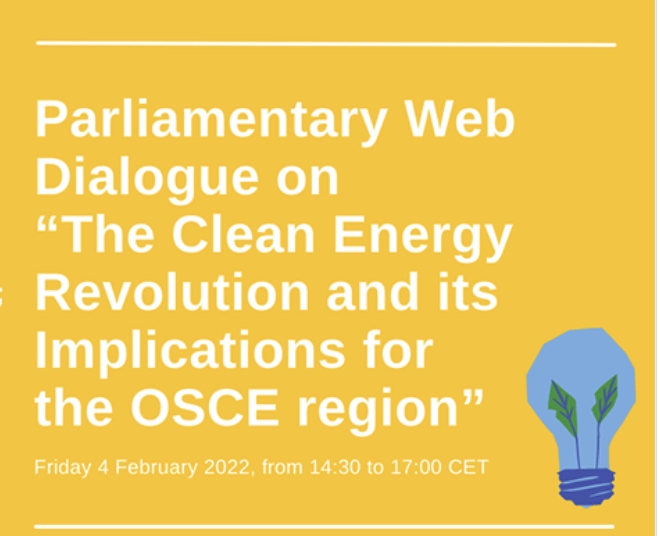Participation of the PABSEC International Secretariat in the OSCE PA Parliamentary Web Dialogue on “The Clean Energy Revolution and its Implications for the OSCE Region”, 4 February 2022
Mr. Miltiadis Makrygiannis, PABSEC Deputy Secretary General, attended, on 4 February 2022, the OSCE PA Parliamentary Web Dialogue on “The Clean Energy Revolution and its Implications for the OSCE Region” which brought together more than 100 parliamentarians, experts and representatives of OSCE participating States for a policy debate to assess current energy trends and explore potential socio-economic and environmental implications of the energy transition.
Members of parliaments, OSCE officials and members of the scientific community discussed the latest technological developments in energy production and possible geopolitical implications of the transition from fossil fuels to clean energy. They considered policies needed to promote a decarbonized, resilient and secure energy sector and the role of national parliaments and interparliamentary fora in this regard.
At the core of the discussions was the awareness of the climate and environmental crisis that is impacting the planet, and the urgent imperative to mitigate it. The need for innovative and environmentally friendly energy policies was emphasized by participants who stressed the need to promote secure, inclusive and healthy societies – characterized by resilient and competitive economies – for the benefit of all citizens.
The expert contributions focused on the role of “humanizing energy” in driving a successful global energy transition, the macroeconomic impacts of the transformation, the role of the private sector in contributing to a viable transition, and the need for the OSCE region to diversify its energy sources both to help curb climate change and to promote energy security. In achieving the clean energy revolution, it is necessary to improve communication with all stakeholders, it was stressed, as the transformation is a systemic shift that will have huge geopolitical and economic effects that go far beyond the energy sector. The emphasis must be on developing collaboration and strategies that involve all levels of society, it was pointed out.

